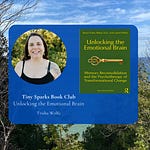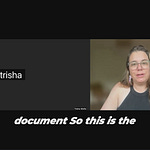Welcome back, book club read-a-long friends! This week, we are diving into chapters 8 and 9 of Adult Children of Emotionally Immature Parents! It’s hard to believe we’re almost finished with this book - it’s truly been such a wonderful exploration. Our live meeting will be Saturday, August 30th, at 10 am Eastern Time (New York). What book should we choose next?! The front runner right now is Unlocking the Emotional Brain, but feel free to cast your vote for what you’re curious about!
(0:00 - 0:35)
Welcome back, book club, to our read-along of Adult Children of Emotionally Immature Parents. It's hard to believe we're getting near the end of this very rich book, but this week we will be going through chapter 8, and hopefully chapter 9, and then our last meeting live together will be Saturday, August 30th at 10 a.m. Eastern Time. If you can't make that time, not to worry, it will be recorded, but I'm really excited to get together and talk about what we learned, what we explored, and what we've noticed with this book, and to answer any final questions.
(0:36 - 3:25)
So you will get that link the week before. Just once more, that live meeting will be August 30th at 10 a.m. Eastern Time on Google Meet. So as we've spent the book learning a little bit about what emotionally immature parents are like and how they affect us and play out in our adult relationships, these two chapters talk a little bit about, now that you know, what do you do? How do you not get hooked back into the pattern? How do you live from a place that is truly yours? And we know because of those predictive patterns in our brain that are always trying to predict what's coming next, based on what's happened in the past, those well-worn neural pathways and emotional learnings that are deeply embedded in there, especially from our childhood experience, that are, we will, we will get hooked back in.
And maybe you've experienced that. Maybe you go home for the holidays and you notice you feel like you're back to being your 10-year-old self, or a five-minute conversation with a parent, and your body feels like you just jumped off of a 500-foot water tower. It's a full thought, emotion, and body sensation experience when we get hooked into these patterns, that we might feel that collapse, that activation, that confusion, that looping.
All of those are signs and signals that we have gotten hooked back into one of these old patterns. Remember, that is our brain working as designed, so it's so important as we explore some of these tools to know these tools are not foolproof. Your brain will, not if, but will get hooked back into these patterns, and that is okay.
That doesn't mean it feels good, but it means it's very, very important to name and notice that we may find ourselves feeling that pull, but over time the pull will be less, and it will shift, and it will feel less like panic, and more like a little present-day stress. And so that is the work of being curious, and noticing, and observing. And if you listen to me all this time, you know that I'm always talking about observing, observing, observing, becoming aware.
What road are we on in our neural pathway atlas map? Are we in an old pathway covered in tigers, or are we in the present day of what's happening right now? When we are hooked into these patterns, and we feel the panic, and the collapse, our brain isn't reacting to what's happening here in the present. It's reacting to past patterns that are landing onto the present, because we're expecting what's going to happen. So we're just waiting for the moment we're going to be criticized, or punished, or love is going to be withdrawn from us.
And so we're very slowly teasing apart old patterns versus what's happening in the present. That's not easy to do. It does take time, and it does take this practice of observation, just like Gibson talks about in this chapter.
(3:26 - 6:50)
So as Gibson talks about stepping out of that old fantasy that we've talked about, that one day if we could just say the right thing, and do the right thing, our parent will become the person we need them to be. As we come out of that more and more, a process that's often called separation and individuation, what that means is over the course of our life really, starting from around age two, we are learning that we are separate and individual from our parents. And we are building our separate and individual identities from them.
And that is what allows us to have a healthy relationship. You can think of two-year-olds saying, no, I want to dress myself. And you can think of teenagers who are like, I never want to be anything like my parents.
That's normal. They're building their identity. They come back around as their own individual, as they have finished that sort of completion of separation and individuation.
When you have emotionally immature parents, you don't get a chance to complete those phases, especially because emotionally immature families are often very enmeshed, meaning no one gets to be separate. And if you try to be separate, and you try to be your own person, have your own feelings, emotions, experiences, you will be punished in some way, through actual punishment, through criticism, or through withdrawal of care and love. And sometimes it's very overt, but sometimes it's much more subtle.
But that separation and individuation is what we're curious about building as we build these new neural pathways in the present. The first thing Gibson talks about to forge a new relationship with our families is that detached observation. You've heard me talk about this many times as the neutral observer or the wildlife documentarian.
It's a practice where instead of being hooked in to the past patterns playing out in the present, we are the ones noticing the hook. We see the hook dangled in front of us. Because we know that emotionally immature people subconsciously will want to hook us back into their patterns, because that's their homeostasis.
That's what feels comfortable and familiar for them. It's very often not intentional, but it's for us to be curious and observe. My wildlife documentarian Gibson calls an anthropological field study, where you're just noticing what's happening both for yourself and for the other person.
And when you start to feel those little flags that you're getting hooked back in, that is the time to pause. So Gibson talks about kind of like repeating to yourself, detach, detach, detach. I would say that's different for everyone.
If that works for you, that's fantastic. For many of us, we may not yet be in a place where that feels good. Because saying detach, detach, detach can really activate that protective child consciousness part of us that is saying it's not safe to detach.
And your adult part saying, but I want to detach. I don't want to be hooked into this. And the child consciousness protective parts of us saying, no, if I detach, I'll lose my relationship.
So I don't necessarily jump to those behavioral sort of cognitive shifts of saying detach, detach, detach to yourself. But you can try on what works for you through a series of mini experiments. Is it walking away? Is it taking a break? Is it looking around the room and find what lets you feel safe in that moment? Is it putting boundaries on how much time you'll be there or whether you'll talk on the phone or actually visit? So it's not a passive process.
(6:50 - 8:17)
It's very, very active. She also talks about relatedness versus relationship. And so staying related to them, where we're not trying to have a satisfying emotional exchange, but we're staying in contact with whatever limits work for us.
Why? Because we know that that person right now, in this moment, doesn't have the capacity for emotional reciprocity and a true, depthful relationship. And trying to get them to that place is part of that fantasy role. Maybe one day they could get there, but that's through their own work.
We can't try to make them get there. In this chapter, Gibson also talks about this maturity awareness approach of different ways to relate to a parent or caregiver who is exhibiting emotional immaturity in the moment, expressing what you want to say and not trying to control the outcome. So not needing the other person to hear you and meet you in an adult way, even if a part of you wants that, focusing on the outcome rather than the relationship.
And so we're looking very specifically at, I want to express myself to my parent, even though I'm nervous, rather than trying to be depthful in the relationship and have that person meet you and explore with you and have a really adult interaction. We know, again, that's not possible. So we're focusing on what we want for ourselves.
(8:17 - 10:56)
And then Gibson also talks about managing not engaging. Maybe you've heard the term jade before. It's often talked about when relating to people who are emotionally immature and not in their adult consciousness.
And it stands for justify, argue, defend, and explain. So when we're engaging with someone who is in an emotionally immature state and they are not in their adult consciousness place, they are not in a relational place, there isn't any use in trying to justify, argue, defend, or explain in trying to engage with them in that way. Because they are in their patterns, and they are in this protective old young state, they aren't going to be able to engage with you in that way.
So being related and managing versus trying to engage in a depthful relationship. Now, what I want to say about this chapter is it's very behavioral. And there are some strategies in here that you might find incredibly helpful.
But it's really important to know that it's very, very common for these approaches to bring up all kinds of things within us. And that is where the work is right now. So what I will often say to people is, yes, this book is great.
It's a self-help book. It's everything crammed into just a few pages. What is very difficult to get through in a book like this is to say, getting from knowing this to doing these steps can be quite a process.
And if we try to rush it, and we try to do it too quickly, we're going to shut ourselves down and put ourselves back into that deep survival response, and go right back into the patterns, both with our parents and with ourselves. So if you read My Five Steps to Change, what I would suggest and offer to you is to do experiments with this book, to do experiments with these things. What is it you're wanting for yourself? And you might say, I want to be less triggered by my parent, or I want to be able to be around my family and not be in fight or flight for days afterward.
Okay, that's where you're wanting to go. What roadblocks come up? What parts of you from an IFS perspective or child consciousness from a NARM perspective get activated when you think about being related but not in relationship? Because that's going to give you a clue to all the old pathways, all the old protective parts of you. If you think about being related but not in relationship and managing versus engaging, it's very likely to be very activating to some parts of you.
Because those are the parts of you that still feel that it's unsafe. Because you have decades of patterning, of feeling that. Because as a child, you rely on your caregivers to keep you feeling safe and alive.
(10:56 - 11:02)
You might feel guilty. You might shame yourself. You might tell yourself, this is impossible.
(11:03 - 11:40)
Or you might try it on and then feel even worse afterward and completely overwhelmed. You might also come up with all these thoughts about how you're actually the bad, horrible person and not them. Those are roadblocks to be explored.
Those are old roadways in the atlas of your brain to notice and explore and then to come into what's happening in the present. And so going back to those five steps to change, you get that practice to notice what's happening now versus what's happening in the present. As a child, it felt like my safety was at risk.
(11:40 - 14:15)
It felt like I had to, for survival, stay in these patterns. Right now, in this exact moment, when I'm feeling so guilty and anxious about changing these patterns, am I actually safe in this moment if I look around the space I'm in right now? And that is how we build the new pathways, the new roadways. So jumping into these behavioral, cognitive tactics before the road is finished is like saying, well, I'm going to go ahead and drive on this new road.
And a construction person comes up to you and says, the bridge isn't finished yet. You can't drive on this road. And you said, oh, I don't care.
I think I'm ready. Well, how are you going to get across the gorge? Right? It's just the same in our brain. And so even though I know a part of us wants it to be better now, we want to be to the other side of things now.
This is an iterative process. And the more we can stay in the process and take it in those five steps at a time, bringing it back to safety, the more quickly we can actually see change and step into that adult consciousness. So we're always looking for those little pause points, those little moments where we can notice the old story and what's happening in the present.
And that mismatch is one of the strongest ways that we can update the routes in our brain and reconsolidate these old emotional learnings, these survival learnings, those little tiny experiments are what let us make those changes. So moving into chapter nine, this chapter is talking about living free of those old rules and fantasies. And so we think about those survival strategies, those adaptive strategies, those parts of us, managers and firefighters and the exiles that hold all of our deepest pain, just like we read about in No Bad Parts.
They're all a part of us. We're not trying to get rid of them. But we're seeing if maybe, possibly, potentially, they would consider letting us drive this bus, since we are the adult, and we have the capacity to live in the present.
So it's so important that we know we're not trying to push those strategies or adaptive, protective parts of us away. We are just asking if they might want to rest, if those pathways might want to, you know, sort of be closed for maintenance now, and that we can start to come into our adult selves, where we can connect into all of the wonderful things and the hard things, but the wonderful things about being able to be an adult and choose ourselves. So remember some of these strategies that comes up that Gibson has talked about in this book.
Listen to this episode with a 7-day free trial
Subscribe to tiny sparks - trisha wolfe to listen to this post and get 7 days of free access to the full post archives.









